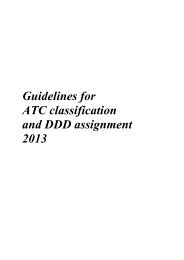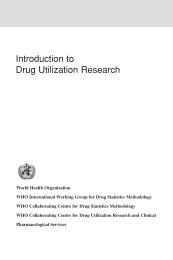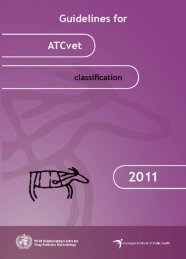Guidelines for ATC classification and DDD assignment - WHOCC
Guidelines for ATC classification and DDD assignment - WHOCC
Guidelines for ATC classification and DDD assignment - WHOCC
Create successful ePaper yourself
Turn your PDF publications into a flip-book with our unique Google optimized e-Paper software.
manufacturers, researchers <strong>and</strong> others). However, as with <strong>ATC</strong> code <strong>assignment</strong>, it<br />
is the manufacturer who will usually have the best access to the required<br />
in<strong>for</strong>mation.<br />
A <strong>DDD</strong> will only be assigned <strong>for</strong> substances which have received an <strong>ATC</strong> code, or<br />
where the <strong>ATC</strong> code can be assigned simultaneously with the <strong>DDD</strong>. <strong>DDD</strong>s are not<br />
assigned be<strong>for</strong>e marketing is approved in at least one country.<br />
All new <strong>DDD</strong>s are discussed <strong>and</strong> approved by the WHO International Working<br />
Group <strong>for</strong> Drug Statistics Methodology.<br />
The steps in the approval procedure <strong>for</strong> new <strong>DDD</strong>s are very similar to the<br />
procedure <strong>for</strong> new <strong>ATC</strong> codes (see page 38, 39):<br />
- The Centre will confirm receipt of the request <strong>for</strong> a new <strong>DDD</strong> <strong>and</strong> give<br />
in<strong>for</strong>mation to those requesting the <strong>DDD</strong> (the applicant) about the time schedule<br />
<strong>for</strong> discussion at the following Working Group meeting.<br />
- After approval of the minutes of the Working Group meeting, the decision from<br />
the meeting concerning the <strong>DDD</strong> is distributed from the Centre to the applicant.<br />
- The new <strong>DDD</strong>s are published on the website www.whocc.no <strong>and</strong> in the next<br />
issue of the WHO publication: WHO Drug In<strong>for</strong>mation. A deadline is then<br />
allowed <strong>for</strong> interested parties to comment or object to the new <strong>DDD</strong>.<br />
- If objections, justified on submitted evidence, are received, the <strong>DDD</strong> will be<br />
discussed again at the following meeting of the Working Group. If the decision is<br />
kept, then the decision is considered final after this meeting. If a new decision is<br />
taken by the Working Group, notification of this new <strong>DDD</strong> is published at our<br />
website www.whocc.no <strong>and</strong> in the next issue of the publication WHO Drug<br />
In<strong>for</strong>mation. A deadline is then allowed <strong>for</strong> any interested part to comment or<br />
object to the decision.<br />
- If no objections are received, the new <strong>DDD</strong> is considered final after the deadline,<br />
<strong>and</strong> included in the next issue of the <strong>ATC</strong> <strong>classification</strong> index (see page 42). A<br />
list of final <strong>DDD</strong>s is also published semi-annually at our website www.whocc.no<br />
<strong>and</strong> in the WHO Drug In<strong>for</strong>mation.<br />
In order to include requests <strong>for</strong> new <strong>DDD</strong>s on the agenda <strong>for</strong> the Working Group<br />
meetings, they should be <strong>for</strong>warded to the Centre be<strong>for</strong>e 15 January (March<br />
meeting) <strong>and</strong> be<strong>for</strong>e 15 August (October meeting). These dates should be<br />
43





